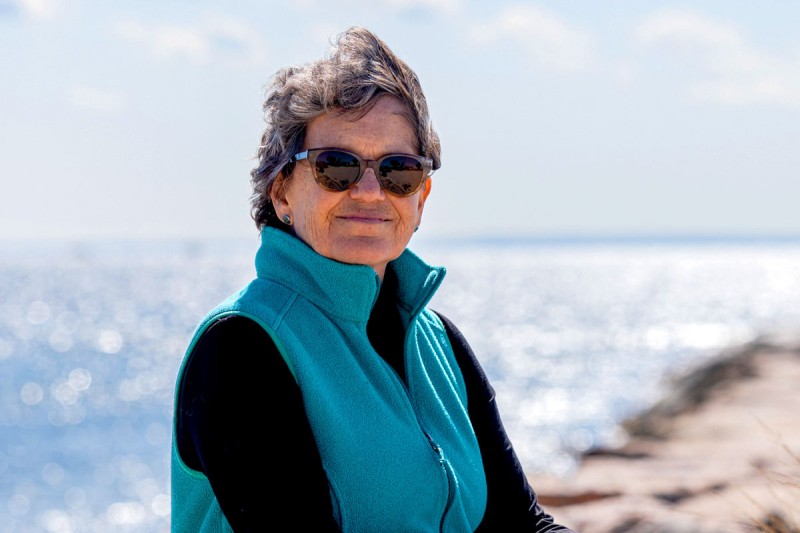
After Joanna Ihlo was diagnosed with breast cancer, she contacted MSK's Patient Financial Services department to make sure she had the right insurance coverage for treatment at MSK.
When Joanna Ihlo learned she had breast cancer, the first thing she worried about was not her health — it was her finances. “I wondered whether I had the right insurance and whether treatment was going to cost me a fortune,” Joanna says. “I have friends who were literally broken by the costs of cancer care.”
Joanna knew she wanted to receive treatment at Memorial Sloan Kettering Cancer Center (MSK), so she called MSK’s Patient Financial Services (PFS) department. An advisor explained her options and suggested that she purchase a Medicare supplement plan. Thanks to that advice and the plan she selected, Joanna says it’s not been a hardship to afford the out-of-pocket costs for her breast cancer care — which has included surgery, chemotherapy, radiation therapy, and consultations with a geriatrician and an integrative medicine specialist.
“Money is always an issue,” says Joanna, 73, a retired school nurse living on a fixed income. “When you’re diagnosed with cancer, it’s very important to have that financial consult.” A Vietnam veteran, she had been receiving health coverage through a combination of benefits from the Department of Veterans Affairs and basic Medicare until the time of her diagnosis.
How MSK Helps Patients Understand Insurance Coverage
MSK has many resources to help patients understand their insurance policy’s coverage for cancer care. The financial services department includes registered nurse case managers and financial specialists who help patients navigate the intricacies of insurance and financial assistance. Together with the clinical teams, they make sure that patients have continued access to care at MSK while avoiding unnecessary out-of-pocket costs.
“Unfortunately, we are seeing patients these days who have to manage the news they have cancer at the same time they learn that their current insurance plans may not adequately provide them with the coverage they need to pay for their treatment,” says Melanie Steele, MPH, Director of Patient Financial Engagement. “Patients are forced into quickly making financial decisions during one of the most stressful times in their lives. We work to support patients by providing them with the financial options and resources based on their situation.”
Reducing direct patient costs whenever possible is a critical part of decreasing “financial toxicity” — the term used to describe the financial stress often caused by the cost of medical care. MSK has experts dedicated to finding ways to decrease financial toxicity, including radiation oncologist Fumiko Chino, MD.
In certain cases, MSK also offers financial assistance to some people with cancer who do not have health insurance or whose insurance doesn’t fully cover their hospital bills.
Providing Integrative Care To Improve Patients’ Quality of Life
Joanna’s care was complex. She had two different types of cancer — one in each breast. Throughout the course of her treatment, she saw several experts at MSK, including:
- Breast surgeon Mahmoud El-Tamer, MD
- Breast medical oncologist Diana Lake, MD, an expert in treating breast cancer in patients who are over age 65
- Radiation oncologist Quincey LaPlant, MD, PhD
- Geriatrician Koshy Alexander, MD
Joanna received most of her care at MSK Westchester, which is closer to her home in New Milford, Connecticut. Her daughter, Amelia, was able to participate in all of her medical appointments by connecting through telemedicine from her home in New Hampshire.
“I can’t say enough good things about MSK,” Joanna says. “I didn’t have a single negative experience.”
Meeting with MSK integrative medicine specialist Gary Deng, MD, PhD, was particularly significant for Joanna. “Dr. Deng helped me choose complementary treatments to deal with all the side effects of cancer and its treatment,” she says. “I had aches and pains, anxiety and stress, sleep problems, and inactivity.”
Cancer treatment, including chemotherapy and hormone therapy, caused Joanna to gain weight — adding to the pounds she’d already put on during COVID-19 lockdowns. Dr. Deng told her that maintaining a healthy weight would reduce the chances of her cancer coming back. He recommended a weight loss app. He also encouraged her to increase her physical activity.
Today, Joanna is cancer free and has lost 15 pounds.
Joanna now has a regular program of hiking, swimming, and taking walks with her dog to stay in shape. “During my treatment, I didn’t feel like I had any energy,” she says. “At my age, you lose strength quickly if you aren’t constantly moving around. Now that I’m doing more, I feel much better.”
Joanna says she’s grateful that in addition to her physical well-being, her financial health is good, too. “I’m so glad that I consulted with a financial expert at MSK before I started my treatment,” she says. “Not having to worry about the costs of treatment made the stressful situation of having cancer a little bit less stressful.”


